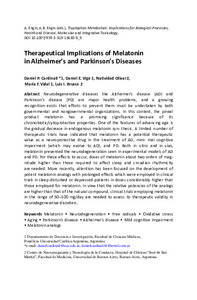Please use this identifier to cite or link to this item:
https://repositorio.uca.edu.ar/handle/123456789/10188| Título: | Therapeutical implications of melatonin in alzheimer’s and parkinson’s diseases | Autor: | Cardinali, Daniel Pedro Vigo, Daniel Eduardo Olivar, Natividad Vida, María F. Brusco, Luis I. |
Palabras clave: | NEURODEGENERACION; RADICALES LIBRES; ESTRES OXIDATIVO; ENVEJECIMIENTO; ENFERMEDAD DE ALZHEIMER; COGNICION; MELATONINA | Fecha de publicación: | 2015 | Editorial: | Humana Press | Cita: | Cardinali, D. P., et al. Therapeutical implications of melatonin in alzheimer’s and parkinson’s diseases [en línea]. En: Engin, A., Engin, A. (eds.). Tryptophan Metabolism: Implications for Biological Processes, Health and Disease. Humana Press: Cham, 2015. doi:10.1007/978-3-319-15630-9_9 Disponible en: https://repositorio.uca.edu.ar/handle/123456789/10188 | Resumen: | Abstract: Neurodegenerative diseases like Alzheimer’s disease (AD) and Parkinson’s disease (PD) are major health problems, and a growing recognition exists that efforts to prevent them must be undertaken by both governmental and nongovernmental organizations. In this context, the pineal product melatonin has a promising significance because of its chronobiotic/cytoprotective properties. One of the features of advancing age is the gradual decrease in endogenous melatonin syn- thesis. A limited number of therapeutic trials have indicated that melatonin has a potential therapeutic value as a neuroprotective drug in the treatment of AD, mini- mal cognitive impairment (which may evolve to AD), and PD. Both in vitro and in vivo, melatonin prevented the neurodegeneration seen in experimental models of AD and PD. For these effects to occur, doses of melatonin about two orders of mag- nitude higher than those required to affect sleep and circadian rhythmicity are needed. More recently, attention has been focused on the development of potent melatonin analogs with prolonged effects which were employed in clinical trials in sleep-disturbed or depressed patients in doses considerably higher than those employed for melatonin. In view that the relative potencies of the analogs are higher than that of the natural compound, clinical trials employing melatonin in the range of 50–100 mg/day are needed to assess its therapeutic validity in neurodegenerative disorders. | URI: | https://repositorio.uca.edu.ar/handle/123456789/10188 | ISBN: | 978-3-319-15630-9 (online) 978-3-319-15629-3 (impreso) |
Disciplina: | MEDICINA | DOI: | 10.1007/978-3-319-15630-9_9 | Derechos: | Atribución-NoComercial-CompartirIgual 4.0 Internacional | Fuente: | Engin, A., Engin, A. (eds.). Tryptophan Metabolism: Implications for Biological Processes, Health and Disease. Humana Press: Cham, 2015 |
| Appears in Collections: | Libros o partes de libro |
Files in This Item:
| File | Description | Size | Format | |
|---|---|---|---|---|
| therapeutical-implications-melatonin-alzheimer.pdf | 1,17 MB | Adobe PDF |  View/Open | |
| 978-3-319-15630-9.jfif | 30,34 kB | Unknown | View/Open |
Page view(s)
314
checked on Feb 4, 2026
Download(s)
804
checked on Feb 4, 2026
Google ScholarTM
Check
Altmetric
Altmetric
Items in DSpace are protected by copyright, with all rights reserved, unless otherwise indicated.
